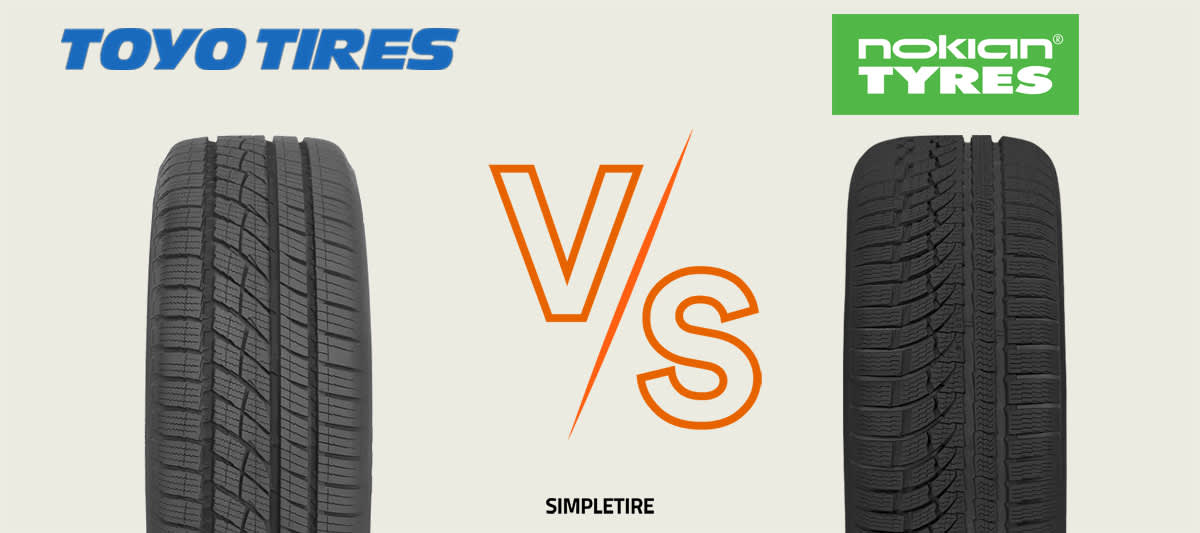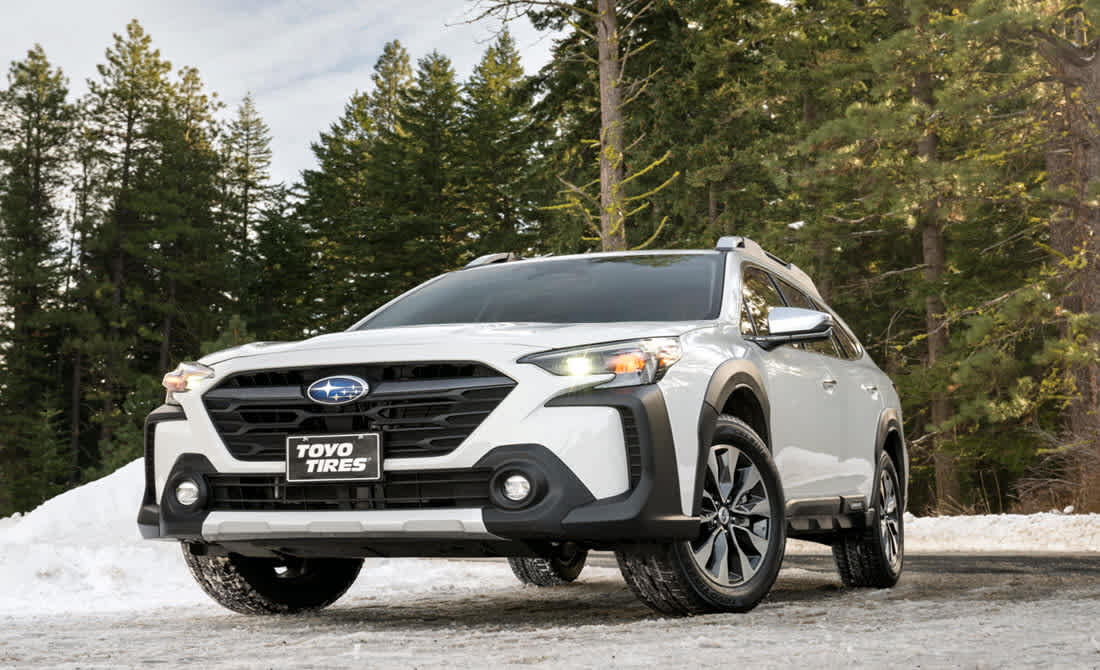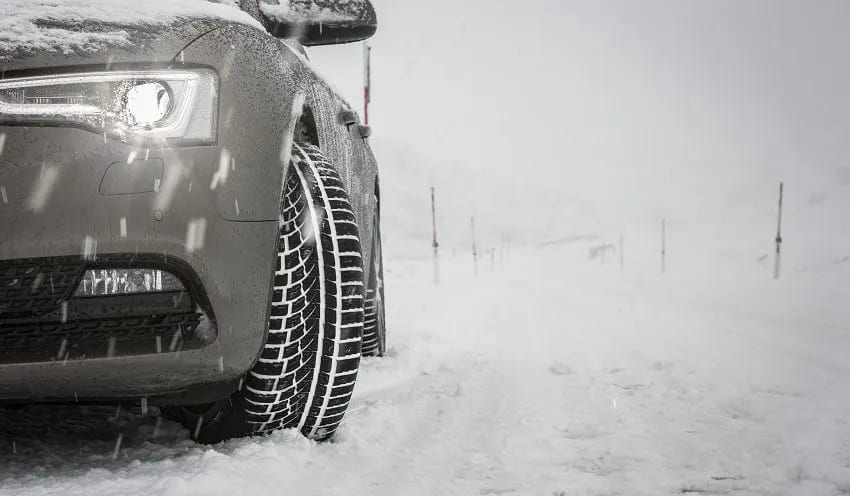Compare
Best price guarantee
Tire replacement coverage
24/7 roadside assistance
Easy returns

The Japanese tire manufacturer Toyo Tire is a popular name among budget-conscious buyers wanting a reliable, efficient, and light-on-the-pocket tire. Established in 1945, the tire maker entered the US market in 1966 and eventually became a revered name for quality off-road tires. Similarly, the Finnish brand Nokian Tyre is a master of winter tires thanks to the highly famous Hakkapeliitta and Nordman tire lines. With different legacies to back them, both manufacturers have tried their hands at a new tire category – all-weather tires. The Celsius II from Toyo and the WR G4 from Nokian are all-weather tires from these tire manufacturers. Let’s delve into more details about them in this comparison.
Designed for coupes, sedans, and minivans, the Toyo Celsius II and Nokian WR G4 offer increased grip, traction, and control on slippery surfaces while keeping long tread life intact. Hundreds of sipes and asymmetric tread patterns boost their performance and handling in dry, wet, and moderate to severe snow and ice. Both are Three Peak Mountain Snowflake certified and offer 60,000 miles limited manufacturer tread life warranties. So, which one will you go for? Let’s compare Toyo Celsius II vs. Nokian WR G4 based on our proprietary SimpleScore system to find out the answer.
Toyo Celsius II tires

Developed for passenger cars, CUVs, and SUVs, the Toyo Celsius II offers great traction from summers to winters thanks to its unique, all-weather rubber compound that adapts to the changing weather conditions and remains flexible for consistent grip and performance in wet, dry, and moderate to extreme winter weather conditions. High-sipe density and zigzag-shaped tread blocks deliver increased traction while interlocking multi-wave siping on shoulders boosts wet and dry performance. With an asymmetric tread pattern, this Toyo all-weather tire offers great stability, handling, and wearability. At the same time, slush grooves help quickly clear snow and slush from the path for effective traction. Meanwhile, the snow claws aid in improving traction by creating extra biting edges. This Three Peak Mountain Snowflake certified tire is backed by a solid 60,000 mile limited manufacturer tread life warranty and other additions such as a 45-day/500 mile trial offer.
With a superb 8.8 average score, the Toyo Celsius II assures great traction, grip, steering response, stability, control, and longevity throughout the year.
Nokian WR G4 tires

Launched in 2018, the Nokian WR G4 is a reliable all-weather tire designed for minivans, coupes, and sedans. While an all-weather dual-performance rubber compound enhances tread life, the WR G4’s centipede siping – jagged 3D sipes resembling the legs of a centipede – lend maximum biting edges for superior grip, handling, and traction. Tested at the tire maker’s White Hell slush-planning testing facility in Ivalo, Finland, the Nokian tire features a longitudinal center rib with tread blocks packed with centipede siping for a broader contact patch for optimum stability and control in slippery conditions. The hinges at the block ends resist tread block movement, leading to reduced rolling resistance and high fuel efficiency. The fan-like blade grooves flush rain, slush, and snow away from the contact patch for consistent performance in changing weather conditions. The Three Peak Mountain Snowflake certified Nokian WR G4 is covered by a 60,000 mile limited manufacturer tread life warranty and a 30-day return with a full refund policy.
With a fantastic 8.8 as its average score, the Nokian WR G4 promises improved year-round performance in unpredictable weather conditions that include moderate to severe winters.
Toyo Celsius II vs Nokian WR G4 tires on traction
Traction ensures that the tire remains in constant contact with the surface without losing grip and control. All-weather tires are known for high traction in dry, wet, and snowy conditions, which is why we must check the traction scores of the Celsius II and the WR G4.
With an all-weather tread design, the Toyo tire features zigzag-shaped tread blocks on the inside and high-sipe density on the outside for increased grip and traction in wet and snow. The special silica compound, snow claws, and slush grooves all come together to maintain flexibility in freezing temperatures and push snow and slush out of the tread for consistent traction. It scores an 8.8 in traction.
Going over and above, the Nokian tire scores a stunning 9.6 out of 10 in traction. Thanks to the sturdy center rib with multiple tread blocks and jagged siping for effective grip and traction on snow and slush. Fan-like blade grooves on the inner shoulder allow quick flow of water, slush, and snow for excellent grip in wet and snowy conditions. Nokian’s COANDA technology ensures the effortless flow of water out of the tread and diminishes the risk of hydroplaning.
The Nokian WR G4 sets a very high benchmark for traction, leaving the Celsius ‘too’ low!
ADVANTAGE: Nokian WR G4
Toyo Celsius II vs Nokian WR G4 tires on handling
In snowy or icy conditions, the steering response becomes more critical as it can seriously compromise safety. Choosing the right set of tires can help you rule treacherous terrains. Let’s see if the two all-weather tires are good enough for maneuvering in low temperatures or not.
Scoring an 8.8 in handling, the Toyo Celsius II features a specialized rubber compound and asymmetric tread design with multi-wave interlocking sipes that improve grip on the surface while returning sure-footed steering response in wet and snow.
The Nokian WR G4 has one of the best handling scores in the all-weather tire category, receiving a magnificent 9.4. Riding on the continuous center rib that features tread blocks with jagged sipes, the Nokian tire offers exceptional handling during cornering. However, the asymmetrical tread pattern here is common between the two tires.
With an outstanding score, the Nokian WR G4 wins the handling battle too.
ADVANTAGE: Nokian WR G4
Toyo Celsius II vs Nokian WR G4 tires on longevity
Defined as the number of years or miles a tire can last, tire longevity is determined by several factors including driving habits, tire quality, air pressure, tire maintenance, and others.
Boasting an excellent 9 out of 10, the Celsius II proves to be a dark horse when it comes to longevity thanks to the asymmetric tread pattern and specialized silica compound that resists uneven wear and promotes uniform wear throughout the tire’s lifecycle. It is backed by a 60,000 mile limited manufacturer tread life warranty that provides complete peace of mind, along with a 45-day/500 mile trial and other features as part of the comprehensive warranty program.
On the other hand, the Nokian WR G4 achieves a decent 8.2 thanks to its all-weather dual-performance compound that promotes even wear while limiting uneven wear. It is backed by a 60,000 mile limited manufacturer tread life warranty and a 30-day return with a full refund.
With an excellent score, the Celsius II finally ‘soars’ to defeat the Nokian WR G4.
ADVANTAGE: Toyo Celsius II
When to use each
All-weather tires are perfect if your region faces unpredictable weather conditions. The special rubber compound adapts to the changing weather conditions of dry, wet, and moderate to severe snow and ice. They fuse the long-lasting capability of all-season tires with the sure-footed gripping of winter tires to lend exceptional performance throughout the year.
However, if the temperature consistently remains below 45 degrees Fahrenheit, we recommend going for winter tires as they are specially made to combat sub-freezing climatic conditions over a long period of time.
Which one should you choose?

To conclude, the Nokian WR G4 is certainly a better all-weather tire if your highest priorities are traction and handling; however, if you want a long-lasting tire, the Toyo Celsius II is your answer. Both are Three Peak Mountain Snowflake certified and offer the same 60,000 mile limited manufacturer tread life warranties. Let’s check their prices to know which one is a better option.
When comparing their prices for the 215/60R16 95H tire size, we found the Toyo to be available for roughly $145 per tire, with four such tires costing $580. In comparison, the Nokian costs approximately $126 per tire and four tires cost $504 (a difference of $76).
Based on the SimpleScores, the Toyo Celsius II is a better option if you:
- Drive vehicles like the Honda Accord, Subaru Outback, and Lexus ES
- Prefer a long-lasting tire (9 vs 8.2)
- Want a longer trial period (45-day vs 30-day)
Conversely, you should choose the Nokian WR G4 if you:
- Drive a Chrysler Sebring, Porsche Cayman, and Audi A6
- Want superior handling (9.4 vs 8.8)
- Cannot compromise on traction (9.6 vs 8.8)
- Want a tire for a hybrid or electric vehicle
Still not sure which tire to buy? Fortunately, SimpleTire is here to help, and our helpful agents will be more than happy to assist you in selecting the right tire for your ride and budget.
Ready to find the perfect tires?
Search By